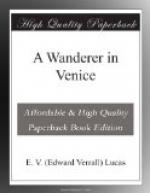Byron’s note to which Hoppner alludes is in Marino Faliero. The conclusion of it is as follows: “The fact is, I hold in utter abhorrence any contact with the travelling English, as my friend the Consul General Hoppner and the Countess Benzoni (in whose house the Converzasione mostly frequented by them is held), could amply testify, were it worth while. I was persecuted by these tourists even to my riding ground at Lido, and reduced to the most disagreeable circuits to avoid them. At Madame Benzoni’s I repeatedly refused to be introduced to them; of a thousand such presentations pressed upon me, I accepted two, and both were to Irish women.”
Shelley visited Byron at the Mocenigo Palace in 1818 on a matter concerning Byron’s daughter Allegra and Claire Clairmont, whom the other poet brought with him. They reached Venice by gondola from Padua, having the fortune to be rowed by a gondolier who had been in Byron’s employ and who at once and voluntarily began to talk of him, his luxury and extravagance. At the inn the waiter, also unprovoked, enlarged on the same alluring theme. Shelley’s letter describing Byron’s Venetian home is torn at its most interesting passage and we are therefore without anything as amusing and vivid as the same correspondent’s account of his lordship’s Ravenna menage. Byron took him for a ride on the Lido, the memory of which formed the opening lines of Julian and Maddalo. Thus:—
I rode one evening with Count
Maddalo
Upon the bank of land which
breaks the flow
Of Adria towards Venice:
a bare strand
Of hillocks, heaped from ever-shifting
sand,
Matted with thistles and amphibious
weeds,
Such as from earth’s
embrace the salt ooze breeds,
Is this; an uninhabited sea-side,
Which the lone fisher, when
his nets are dried,
Abandons; and no other object
breaks
The waste, but one dwarf tree
and some few stakes
Broken and unrepaired, and
the tide makes
A narrow space of level sand
thereon,
Where ’twas our wont
to ride while day went down.
This ride was my delight.
I love all waste
And solitary places; where
we taste
The pleasure of believing
what we see
Is boundless, as we wish our
souls to be:
And such was this wide ocean,
and this shore
More barren than its billows;
and yet more
Than all, with a remembered
friend I love
To ride as then I rode;—for
the winds drove
The living spray along the
sunny air
Into our faces; the blue heavens
were bare,
Stripped to their depths by
the awakening north;
And, from the waves, sound
like delight broke forth
Harmonizing with solitude,
and sent
Into our hearts aerial merriment.
When the ride was over and the two poets were returning in Byron’s (or Count Maddalo’s) gondola, there was such an evening view as one often has, over Venice, and beyond, to the mountains. Shelley describes it:—




